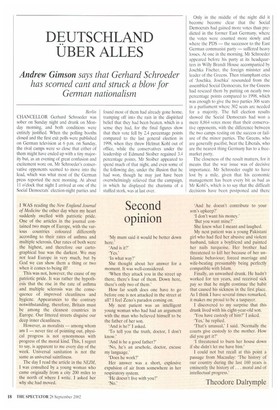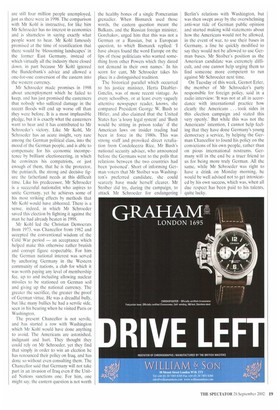DEUTSCHLAND UBER ALLES
Andrew Gimson says that Gerhard Schroeder
has scorned cant and struck a blow for German nationalism
Berlin CHANCELLOR Gerhard Schroeder was sober on Sunday night and drunk on Monday morning, and both conditions were entirely justified. When the polling booths closed and the first exit polls were published on German television at 6 p.m. on Sunday, the rival camps were so close that either of them might have ended up with a tiny majority but, as an evening of great confusion and excitement wore on, Mr Schroeder's conservative opponents seemed to move into the lead, which was what most of the German press reported the next morning. At about 11 o'clock that night I arrived at one of the Social Democrats' election-night parties and
found most of them had already gone home, tramping off into the rain in the dispirited belief that they had been beaten, which in a sense they had, for the final figures show that their vote fell by 2.4 percentage points compared to the last general election in 1998, when they threw Helmut Kohl out of office, while the conservatives under the leadership of Edmund Stoiber regained 3.4 percentage points. Mr Stoiber appeared to spend much of that night, and even some of the following day, under the illusion that he had won, though he may just have been overwhelmingly relieved that the campaign, in which he displayed the charisma of a stuffed stork, was at last over. Only in the middle of the night did it become become clear that the Social Democrats had gained more votes than predicted in the former East Germany, where the votes were counted more slowly and where the PDS — the successor to the East German communist party — suffered heavy losses. At one in the morning, Mr Schroeder appeared before his party at its headquarters in Willy Brandt House accompanied by Joschka Fischer, the foreign minister and leader of the Greens. Then triumphant cries of Joschka, Joschka' resounded from the assembled Social Democrats, for the Greens had rescued them by putting on nearly two percentage points compared to 1998, which was enough to give the two parties 306 seats in a parliament where 302 seats are needed for a majority. The full election results showed the Social Democrats had won a mere 8,864 votes more than their conservative opponents, with the difference between the two camps resting on the success or failure of the minor parties. The Greens, who are generally pacifist, beat the Liberals, who are the nearest thing Germany has to a freemarket party.
The closeness of the result matters, for it means that the war issue was of decisive importance. Mr Schroeder ought to have lost by a mile, given that his economic management has been every bit as bad as Mr Kohl's, which is to say that the difficult decisions have been postponed and there are still four million people unemployed, just as there were in 1998. The comparison with Mr Kohl is instructive, for like him Mr Schroeder has no interest in economics and is shameless in saying exactly what people want to hear. Mr Kohl famously promised at the time of reunification that there would be 'blossoming landscapes' in the former East Germany, instead of which virtually all the industry there closed down. in part because Mr Kohl ignored the Bundesbank's advice and allowed a one-for-one conversion of the eastern into the western currency.
Mr Schroeder made promises in 1998 about unemployment which he failed to keep, and has just promised the easterners that nobody who suffered damage in the recent floods will end up worse off than they were before. It is a most implausible pledge, but it is exactly what the easterners want to hear and it has contributed to Mr Schroeder's victory. Like Mr Kohl, Mr Schroeder has an acute insight, very rare among the German political class, into the mood of the German people, and is able to compensate for his economic incompetence by brilliant electioneering, in which he convinces his compatriots, or just enough of them, that he is the protector, the patriarch, the strong and decisive figure the fatherland needs at this difficult time. Like his predecessor, Mr Schroeder is a successful nationalist who aspires to unite Germany, yet he achieves some of his most striking effects by methods that Mr Kohl would have abhorred. There is a sense, indeed, in which Mr Schroeder saved this election by fighting it against the man he had already beaten in 1998.
Mr Kohl led the Christian Democrats from 1973, was Chancellor from 1982 and accepted the conventional wisdom of the Cold War period — an acceptance which helped make this otherwise rather brutish and corrupt figure respectable. For him the German national interest was served by anchoring Germany in the Western community of nations, a club for which it was worth paying any level of membership fee, up to and including allowing nuclear missiles to be stationed on German soil and giving up the national currency. The greater the sacrifice, the greater the proof of German virtue. He was a dreadful bully, but like many bullies he had a servile side, seen in his bearing when he visited Paris or Washington.
The present Chancellor is not servile, and has started a row with Washington which Mr Kohl would have done anything to avoid. The Americans are astonished, indignant and hurt. They thought they could rely on Mr Schroeder, yet they find that simply in order to win an election he has renounced their policy on Iraq, and has done so without even consulting them. The Chancellor said that Germany will not take part in an invasion of Iraq even if the United Nations sanctions one. For him, one might say, the eastern question is not worth the healthy bones of a single Pomeranian grenadier. When Bismarck used those words, the eastern question meant the Balkans, and the Russian foreign minister, Gorchakov, urged him that this was not a German or a Russian, but a European question, to which Bismarck replied: 'I have always found the word Europe on the lips of those politicians who wanted something from other Powers which they dared not demand in their own names.' In his scorn for cant, Mr Schroeder takes his place in a distinguished tradition.
The historical parallel which occurred to his justice minister, Herta DaublerGmelin, was of more recent vintage. As every schoolboy, or at least every vaguely attentive newspaper reader, knows, she compared President George W. Bush to Hitler, and also claimed that the United States has 'a lousy legal system' and 'Bush would be sitting in prison today' if the American laws on insider trading had been in force in the 1980s. This was strong stuff and provoked direct retaliation from Condoleezza Rice, Mr Bush's national security adviser, who announced before the Germans went to the polls that relations between the two countries had been 'poisoned'. Short of informing German voters that Mr Stoiber was Washington's preferred candidate, she could scarcely have made herself clearer. Mr Stoiber did try, during the campaign, to attack Mr Schroeder for endangering Berlin's relations with Washington, but was then swept away by the overwhelming anti-war tide of German public opinion and started making wild statements about how the Americans would not be allowed, in the event of war, to use their bases in Germany, a line he quickly modified to say they would not be allowed to use German bases. Mr Stoiber's position as the American candidate was extremely difficult, and one cannot help urging them to find someone more competent to run against Mr Schroeder next time.
On Tuesday of this week, Gernot Erler, the member of Mr Schroeder's party responsible for foreign policy, said in a radio interview: 'It was not at all in accordance with international practice how clearly the Americans . . took sides in this election campaign and stated this very openly.' But while this was not the Americans' intention, I cannot help feeling that they have done Germany's young democracy a service, by helping the German Chancellor to found his policy on the convictions of his own people, rather than on pious international nostrums. Germany will in the end be a truer friend to us for being more truly German. All the same, while Mr Schroeder was right to have a drink on Monday morning, he would be well advised not to get intoxicated by his own success, which was, when all due respect has been paid to his talents, quite lucky.



































































































 Previous page
Previous page